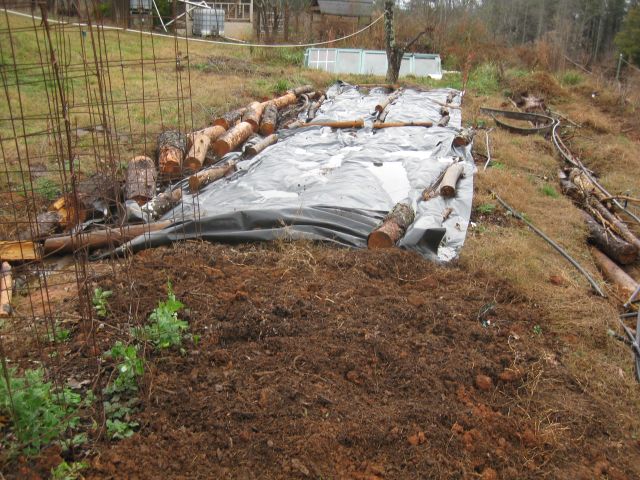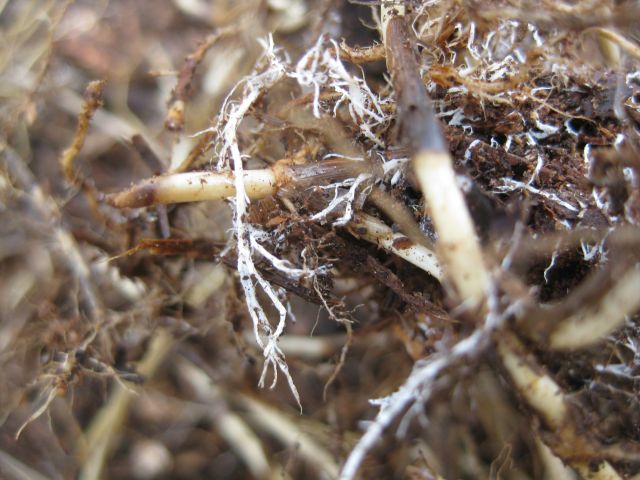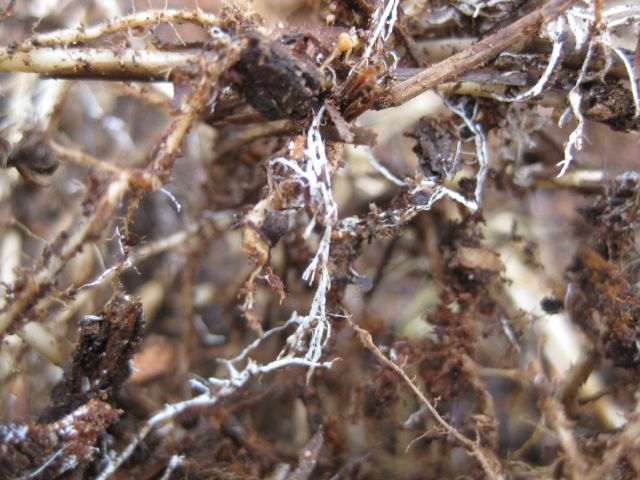In my 9/21 post I described various tactics I am using to eradicate Bermuda grass organically and how I covered an area with 6mm thick commercial grade black plastic. Bermuda grass likes heat and rather than try solarize it with clear plastic (and this would only have possibly worked if I had tried this before the onset of summer), I thought completely depriving it of light might be more effective.
Today, some 3 months later, I decided I needed some of the covered area to plant out my remaining garlic cloves. Also I was curious to see what effect the exclusion of light had on the bermuda grass.

I lifted some of the black plastic covering, forked up a chunk of soil and pulled on the Bermuda shoots. To my surprise they slipped easily out of the soil, much more easily that an adjacent area which I had just finished clearing. So I decided to look more closely and noticed that the fungi strands on the ground, which I associated with the wood chips I had dumped the previous year, were actually decomposing the roots on the Bermuda grass shoots. Without their roots, the Bermuda grass shoots slid easily out of the moist soil.

So the fungi attacked the roots. I am assuming this is decomposing (saprophytic) fungi (rather than parasitic) and they migrated from working on the wood chips.

This could mean that either the Bermuda grass had died or had gone into a very deep withdrawal. Bermuda grass hibernates every winter – it turns white and to northern visitors looks as if it is dead. But in the spring the green shoots appear and, as the weather heats up, it comes vibrantly to life. But I have not seen fungus attack overwintering Bermuda, so it seems likely that the black plastic covering had a significant effect.
I shall leave some of the covering in place through spring and then see if the grass can rejuvenate itself, and if it doesn’t then this will be a viable non manual yet organic way to combat Bermuda grass – establish fungi, seclude the grass from light and let the fungi do their work.
In the meantime I shall continue clearing the now vulnerable Bermuda grass from more of the area so I can install garlic and several varieties of kale which should do well in the winter in this very sun exposed site.

How did it go? I’m so curious. I have a manure pile invaded with bermuda grass. My newest strategy is to cover it with cardboard to block out light and then pile 2 feet of hot horse manure on top. In my other manure pile this amount of manure gets cooking even though it’s not the standard 3′ x 3′ compost. I’m hoping to kill off any sprouts that make it through the cardboard. My timing may be off, so I’m going to keep adding manure all spring and pray.
I’m now wondering if I should add some black plastic at some point. Any thoughts?
Thank you for your two comments. My last post was December 2012 and now, with a year behind me, I am pleased to say that I have completely eradicated the Bermuda grass in the described area. It was, I believe a result of my two combination offensive – the black plastic and the fungi. The Bermuda would probably have survived the black plastic but, in its weakened state the fungi nailed it. So how do you get the fungi going – and there are lots of different species and I am talking generally. Manure will not help – it is rich in nitrogen and good for bacteria which are the antithesis of fungi. I mentioned I had wood chips in the area which harbored the fungi. Also my compost, unfortunately, has a high ratio of brown to green ingredients which means it is a friendly host to fungi but not to bacteria. So my wood chips and the fungi dominant compost activated the attack on the Bermuda which, altho it is a grass, it is a tough grass and needed fungi to break it down. I mentioned my compost “unfortunately” is fungi dominant because although it is good for my fruit trees and blueberries it doesn’t do much for my annuals and I am now trying compost teas and various stratagems to help the bacteria become dominant.
As for the black edging it did dissuade some invaders and it establishes a perimeter which you have to defend.
Thank you for your detailed reply. I appreciated it greatly!